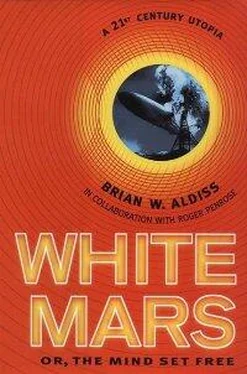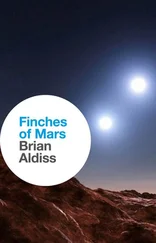Brian Aldiss - White Mars
Здесь есть возможность читать онлайн «Brian Aldiss - White Mars» весь текст электронной книги совершенно бесплатно (целиком полную версию без сокращений). В некоторых случаях можно слушать аудио, скачать через торрент в формате fb2 и присутствует краткое содержание. Год выпуска: 1999, ISBN: 1999, Издательство: Little, Brown UK, Жанр: Фантастика и фэнтези, на английском языке. Описание произведения, (предисловие) а так же отзывы посетителей доступны на портале библиотеки ЛибКат.
- Название:White Mars
- Автор:
- Издательство:Little, Brown UK
- Жанр:
- Год:1999
- ISBN:0-316-85243-0
- Рейтинг книги:5 / 5. Голосов: 1
-
Избранное:Добавить в избранное
- Отзывы:
-
Ваша оценка:
- 100
- 1
- 2
- 3
- 4
- 5
White Mars: краткое содержание, описание и аннотация
Предлагаем к чтению аннотацию, описание, краткое содержание или предисловие (зависит от того, что написал сам автор книги «White Mars»). Если вы не нашли необходимую информацию о книге — напишите в комментариях, мы постараемся отыскать её.
White Mars — читать онлайн бесплатно полную книгу (весь текст) целиком
Ниже представлен текст книги, разбитый по страницам. Система сохранения места последней прочитанной страницы, позволяет с удобством читать онлайн бесплатно книгу «White Mars», без необходимости каждый раз заново искать на чём Вы остановились. Поставьте закладку, и сможете в любой момент перейти на страницу, на которой закончили чтение.
Интервал:
Закладка:
As almost everyone of that first Martian population agreed, to survive on Mars close cooperation was a necessity. The individual ego had to submit to the needs of the whole body of people.
Continual television reports from Mars brought to the attention of the Downstairs world (as we came to call Earth) the fairness of Martian governance and our egalitarian society. It contrasted markedly with terrestrial injustice and inequality.
I don’t want to talk about my own troubles, but I had been rather upset by the voyage from Earth, so much so that I had been referred to a psychurgist, a woman called Helen Panorios.
Helen had a dim little cabin on one of the outer spicules where she saw patients. She was a heavily built lady with dyed purple hair. I never saw her wearing anything other than an enfolding black overall-suit. A mild woman she was, who did seem genuinely interested in my problems.
As I explained to her, the six-month journey in cryosleep had terrified me. I had been detached from my life and seemed unable to reconnect with my ego. It was something to do with my personality.
“Some people hate the experience; some enjoy it as a kind of spiritual adventure. It can be seen as a sort of death, but it is a death from which you reawaken—sometimes with a new insight into yourself.” That’s what she kept telling me. Basically she was saying that most people accepted cryosleep as a new experience. Just coming to Mars, being on Mars, was a new experience.
I had come to hate the very name EUPACUS. The thought of undergoing that same annihilation getting home again to Earth scared me rigid. There had to be a better way of making that journey across millions of miles of space—or matrix as the new more correct term had it. Interstellar matrix teemed with radiations and particles, so that to naked experience “space” had come to have a Victorian ring about it.
Travel between Earth and Mars was on the increase, or at least it had been before the disaster. Marvelos was hard pressed to meet the demand. Space vehicles were manufactured in terrestrial orbit under licence. Practically every industrialised nation of Earth was involved in their manufacture, if only in making pillows for the coffin-cots. The space vehicles, each with elaborate back-up facilities, were billion-dollar items. Shareholders were reluctant to invest in more rapid development. Takeovers and mergers of companies were happening all the time under the EUPACUS roof.
Helen talked me through the entire process of a voyage.
The consortium’s ferry ships carried us passengers up from Earth to the interplanetaries, which parked in orbit about Earth and Luna. I was queasy from the start, even with a g-snort in me. I’m really not a good traveller. Then we passed into the interplanetary passenger ships, popularly known as “fridge wagons”. You never forget the curious smell in a fridge wagon. I believe they start right away with some sort of airborne anaesthetic circulating.
“I didn’t care for the way the compartments were so like refrigerated coffins,” I told Helen. Even before the wagon released from orbit, you were going rapidly into that dark nowhere of cryosleep as bodily functions slowed. That was terror for me …
“You were primed beforehand, Cang Hai, dear,” said Helen. “You know well the economics of that journey back at that stage of development. Taking passengers in cryosleep obviates the need for the ships to carry food and water. Little air is needed. Fuel and expense are saved. Otherwise, well, no trip…”
I relived the rush upwards from Earth. For most people, the spirit of adventure overcame any feelings of sickness, though not for me. Two hundred and fifty-six kilometres up, the barrel shape of the fridge wagon loomed, riding in its orbit. It had looked small, then it was enormous. Its registration number was painted large on its hull.
You have to admit it was a neat manoeuvre, considering the speed at which both bodies were travelling. With hardly a jar, they locked. I did then dare, before entering the wagon, to take a last look out at the Earth we were leaving. Fridge waggons have no ports.
I had to cry a little. Helen tenderly placed a hand on my shoulder, like the mother I never had, saying nothing. I was leaving behind my Other, back in Chengdu. Nobody would understand that.
Once in that strange-smelling interior, dense with low murmurs of various machines, we were guided to a small apartment, a locker room really. There one undressed with a neuter android in attendance, stowed away one’s few belongings, and took a radiation shower. It was like preparing for a gas chamber. Advised by the android, you now had to lock your bare feet into wall-grooves and clasp the rungs in the curving wall above head level. The compartment now swung and travelled to a vacant coffin-cell. Music played. The aria “Above my feet the roses speak…” from Delaport’s opera Supertoys.
Then you were somehow motionless and monitors uncoiled like snakes. Tiny feeds attached themselves to your body. Before the wagon left orbit, your body temperature was approaching that of frozen meat. You might as well have been dead. You were dead.
I did a bit of screaming in front of Helen Panorios. Gradually I seemed to get better.
We worked through the disorientation of rousing back to life in Mars orbit, speeding above all that varied tumble of rock and desert and old broken land.
“You certainly have to welcome new experience to get that far!” I said at one point.
When disaster struck, those who welcomed new experience were certainly well prepared for anything. Which was an important factor in influencing what happened to us all.
Helen rather liked to lecture me. She called it “establishing a context”. Marvelos organised two types of visit to Mars, one when Earth and Mars were in conjunction, (called the CRT, the Conjunction Return Trip), one when they were in opposition (called the ORT, the Opposition Return trip).
Outward bound both trips took half a year. It was inevitable that those trips had to be passed in cryosleep.
Perhaps it’s worth reminding people that by “year” I always mean Earth year. Earth imposed its year on Mars thinking much as the Christian calendar had been imposed over most of Earth’s nations, whether Christian or not. We will come to the rest of the Martian calendar and our clocks later.
The difficulty lay in the provision of return journeys. Helen grew quite excited about this. She showed me slides. While the return leg of an ORT took an uncomfortable year, the CRT took only half a year, no longer than the trip outwards. The snag was that the ORT required a stay of only thirty days on Mars, which was generally regarded as a pretty ideal time period, whereas the CRT entailed a stay of over a year and a half.
I was booked for an ORT, and found I couldn’t face the mere thought of it. Helen had booked on a CRT. Her time away from Earth was going to be eighteen times longer than mine. Although I remained in touch with my Other in Chengdu, I could not have faced such a long stretch away. Now I found I could not face the long year in cryosleep.
Of course everyone who came to Mars had made these decisions. Despite such obstacles, the number of applications for flights increased month by month, as those returning reported on what for most was the great emotional experience of their lifetime.
The UN and EUPACUS between them agreed on the legal limits of those permitted to visit Mars. Their probity had to be proved. So it had fallen out that those who came to Mars arrived either as YEAs or as DOPs.
The arrangements for a Mars visit were long and complex. As EUPACUS grew, it became more and more bureaucratic, even obfuscatory. But the rule was quickly established that only these two categories of persons ever came to Mars, and then only under certain conditions. (This excluded the cadre needed for Martian services.)
Читать дальшеИнтервал:
Закладка:
Похожие книги на «White Mars»
Представляем Вашему вниманию похожие книги на «White Mars» списком для выбора. Мы отобрали схожую по названию и смыслу литературу в надежде предоставить читателям больше вариантов отыскать новые, интересные, ещё непрочитанные произведения.
Обсуждение, отзывы о книге «White Mars» и просто собственные мнения читателей. Оставьте ваши комментарии, напишите, что Вы думаете о произведении, его смысле или главных героях. Укажите что конкретно понравилось, а что нет, и почему Вы так считаете.










